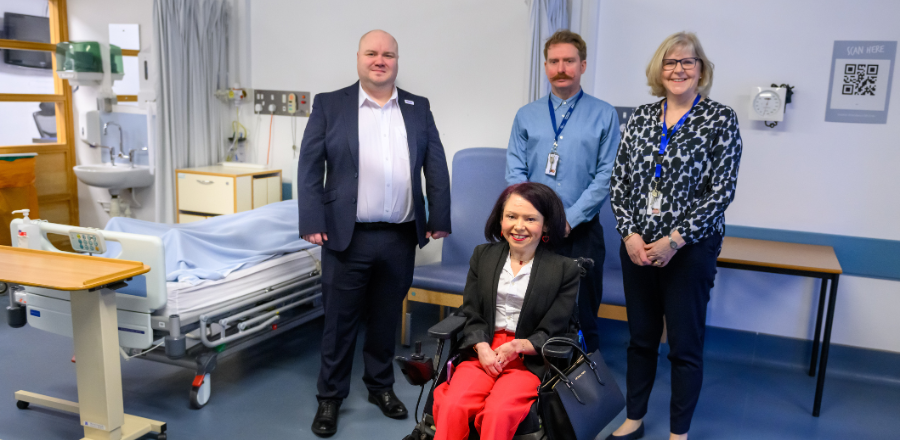MSP visits Glasgow Caledonian to find out more about life-changing stroke research

Glasgow Caledonian University welcomed MSP for Glasgow (Region) Pam Duncan-Glancy on campus to showcase a new project aimed at reducing disability in stroke survivors.
Researchers at Glasgow Caledonian, funded by the Stroke Association, have launched a study looking into how intensive physiotherapy, partly delivered remotely, can change the lives of people who have had a stroke and their families.
Ms Duncan-Glancy, Shadow Cabinet Secretary for Education, was keen to visit our Glasgow campus to find out more about the 'PeRsonAlised Community-based TelerehabIlitation post StrokE to increase rehabilitation time and improve motor recovery: a feasibility study (PRACTISE)'.
Ms Duncan-Glancy said: "Scotland's universities are leading the way in research, and it was an honour to see that in action with the Stroke Association at Glasgow Caledonian University. This project between the third sector and Glasgow Caledonian has the potential to significantly improve the lives of many people living with a stroke. I look forward to hearing more about the success of the project once completed."
She was given a tour of the University's School of Health and Life Sciences' state-of-the-art Simulation Centre, which looks and feels like a real hospital with adult and paediatric wards, an emergency room, and X-ray, radiotherapy and home environment suites.
Ms Duncan-Glancy met Professor of Allied Health Science Lorna Paul, from the Department of Physiotherapy and Paramedicine, who is leading the three-year study, which will work with up to 60 people within two months of having their first stroke.
During the visit, Ms Glancy was also introduced to Michael Foley, Stroke Association Public Affairs and Campaigns Officer in Scotland, PRACTISE study co-ordinator Dr Colin Shore, and co-applicants in the study - Professor of Neurological Rehabilitation Frederike Van Wijck, Professor of Nursing Lisa Kidd, Professor of Health Economics Helen Mason and stroke survivor Keith Jenkinson.
Professor Paul said: "Our PRACTISE study aims to ensure that people who have suffered a stroke have the best outcome possible, through supporting them to undertake more rehabilitation, especially out-with the NHS-provided therapy sessions.
"We were delighted to welcome Pam Duncan-Glancy to the University to learn more about the study, meet the study team and stroke survivors, and to understand the significant effect this study may have on the lives of people following a stroke."
Mr Foley explained to Ms Duncan-Glancy the extent of the problem in Scotland and why the Stroke Association-funded PRACTISE project is so important in helping the NHS cope with the growing challenges.
Mr Foley said: "We are delighted to be funding Glasgow Caledonian University's study of the use of telerehabilitation in stroke, as part of our work to improve rehabilitation and long-term care.
"We know that rehabilitation is vital to a stroke survivor's recovery, but Scotland's health boards are struggling to meet national guidelines for daily therapy.
"Professor Paul's research could establish new ways of working to deliver physiotherapy more often, to help people lead independent lives."
Scotland has the highest incidence of stroke of the four UK nations, the worst outcomes, and the largest proportion of people living with disability because of stroke and a higher proportion of strokes in Scotland are now happening to younger (aged under 60) people.
More than 10,000 people in Scotland suffer from a stroke each year, there are 130,000-plus people living with the effects of a stroke and it's Scotland's biggest single cause of adult disability.
